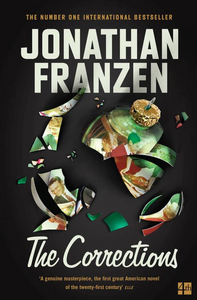You need to sign in or sign up before continuing.
Take a photo of a barcode or cover
emotional
funny
reflective
slow-paced
Plot or Character Driven:
Character
Strong character development:
Yes
Loveable characters:
No
Diverse cast of characters:
No
Flaws of characters a main focus:
Yes
I hate it, but it was good.
Graphic: Adult/minor relationship, Alcoholism, Drug use
Moderate: Suicidal thoughts
challenging
dark
emotional
funny
medium-paced
Plot or Character Driven:
Character
Strong character development:
Yes
Loveable characters:
Complicated
Diverse cast of characters:
Yes
Flaws of characters a main focus:
Yes
reflective
medium-paced
emotional
funny
reflective
medium-paced
Plot or Character Driven:
Character
Strong character development:
Complicated
Loveable characters:
No
Diverse cast of characters:
No
Flaws of characters a main focus:
Yes
I was fully drawn into this story of the disintegration of this family’s own self image and the realisation that often it is the fascade that they had developed for themselves as their own markers for success is the thing that is making them unhappy, and how dependent on other people’s judgement of them they were for their own happiness.
I'm extremely annoyed that I didn't realize the audiobook was abridged until the final credits. Now I see that the unabridged version was nearly twice as long. I hate not knowing what was cut.
The characters were so unlikeable and pathetic, especially Alfred and Enid. I didn't hate the book, but they are everything I disliked about my Midwestern grandparents (with none of the good qualities).
A bit of classic Russian (only in the rambling descriptiveness of Tolstoy, the aspirational depth of the characters of Dostoevsky), without the moral aspirations or transformative social commentary. Yet, I loved reading this book. There was too much poignant societal critique to not deeply relate to this dysfunctional family, a reminder of where many us (generation x & y) have come from, and where we have ended up. Bleak and little hope to be found, at the very least Franzen's way with words is enough to give this contemporary classic five stars.
emotional
funny
lighthearted
reflective
medium-paced
Plot or Character Driven:
A mix
Strong character development:
Yes
Loveable characters:
No
Diverse cast of characters:
Yes
Flaws of characters a main focus:
Yes
A positive impression despite innumerable faults
The phenomenon of the persistent positive impression is something I call The Carver Effect (After Raymond Carver, whom I continue to admire despite significant reservations regarding most all his stories. (Inverse of The Borges Effect, whose author still leaves a middling impression despite my enjoying, to a certain extent, many of his works. (Though my favorite remains The Aleph, perhaps the least Borges of Borges in that it contains at least a residue of human interest.)))
Franzen's characters have a tendency to fall flat. Their situations read contrived. The spoof of inflated campus-adjacent post-docs and empty-hole bourgeois is roll-my-eyes bad. His women don't have non-Bechdel problems. Their inner lives, though effortfully described, remain prurient sketches. The paterfamilias possesses an improper prosody, "Better not to leave here than to have to come back." (This, we no longer have to assume, is a direct quotation from Franzen's actual father, affixed to the last page of the novel in incongruity with (revolt against) the surrounding prose.)
Yet, Franzen displays a studied way of describing things as if he has actually seen them. About once or twice a paragraph one encounters something clever, or so intimately characterized one almost has the impression the reader's own life has been captured on the page (similar to certain, not-infrequent moments in Nabokov). "Corpuscular" impressions of the "crepuscular." The maniacal game of kicking packages up the stairs. Circling 'M's in the New York Times. The pan-fried liver warped so that it won't sit flat on a plate. "Buttery" alkali metals. The instinctual photo-taking of one's spouse later revealed, in a moment of reverse-anagnorisis, (analogous to a certain powerful scene in To the Lighthouse i.e. the dramatic irony is that characters know something we do not) such that the instinctual taking of photographs read as "sign of intimacy" is revealed to be motivated by the construction of a "body of evidence" against her - as evidence one was already in pain.
"He saw nothing but the principles [principals] at stake." [my reading]
"He's sowing salt in the field of the financially unrighteous."
The phenomenon of the persistent positive impression is something I call The Carver Effect (After Raymond Carver, whom I continue to admire despite significant reservations regarding most all his stories. (Inverse of The Borges Effect, whose author still leaves a middling impression despite my enjoying, to a certain extent, many of his works. (Though my favorite remains The Aleph, perhaps the least Borges of Borges in that it contains at least a residue of human interest.)))
Franzen's characters have a tendency to fall flat. Their situations read contrived. The spoof of inflated campus-adjacent post-docs and empty-hole bourgeois is roll-my-eyes bad. His women don't have non-Bechdel problems. Their inner lives, though effortfully described, remain prurient sketches. The paterfamilias possesses an improper prosody, "Better not to leave here than to have to come back." (This, we no longer have to assume, is a direct quotation from Franzen's actual father, affixed to the last page of the novel in incongruity with (revolt against) the surrounding prose.)
Yet, Franzen displays a studied way of describing things as if he has actually seen them. About once or twice a paragraph one encounters something clever, or so intimately characterized one almost has the impression the reader's own life has been captured on the page (similar to certain, not-infrequent moments in Nabokov). "Corpuscular" impressions of the "crepuscular." The maniacal game of kicking packages up the stairs. Circling 'M's in the New York Times. The pan-fried liver warped so that it won't sit flat on a plate. "Buttery" alkali metals. The instinctual photo-taking of one's spouse later revealed, in a moment of reverse-anagnorisis, (analogous to a certain powerful scene in To the Lighthouse i.e. the dramatic irony is that characters know something we do not) such that the instinctual taking of photographs read as "sign of intimacy" is revealed to be motivated by the construction of a "body of evidence" against her - as evidence one was already in pain.
"He saw nothing but the principles [principals] at stake." [my reading]
"He's sowing salt in the field of the financially unrighteous."
"Without ever figuring out that this excruciating perpendicular stroke was actively suppressing orgasm."
I really enjoyed this book. It took me forever to find the motivation to read it but I am so glad that I did.
If you thought your family was dysfunctional...
some entertaining tidbits:
==============================
"She takes pills for three months, the pills make her unbelievably obtuse, and the obtuseness then defines itself as mental health! It's like blindness defining itself as vision. 'Now that I'm blind, I can see there's nothing to see'."
==============================
"I'm saying the structure of the entire culture is flawed," Chip said. "I'm saying the bureaucracy has arrogated the right to define certain states of mind as 'diseased'. A lack of desire to spend money becomes a symptom of disease that requires expensive medication. Which medication then destroys the libido, in other words destroys the appetite for the one pleasure in life that's free, which means the person has to spend even more money on compensatory pleasures. The very definition of mental 'health' is the ability to participate in the consumer economy. When you buy into therapy, you're buying into buying. And I'm saying that I personally am losing the battle with a commercialized, medicalized, totalitarian modernity right this instant."
==============================
"Chip was struck by the broad similarities between black-market Lithuania and free-market America. In both countries, wealth was concentrated in the hands of a few; any meaningful distinction between private and public sectors had disappeared; captains of commerce lived in a ceaseless anxiety that drove them to expand their empires ruthlessly; ordinary citizens lived in ceaseless fear of being fired and ceaseless confusion about which powerful private interest owned which formerly public institution on any given day; and the economy was fueled largely by the elites insatiable demand for luxury."
"The main difference between America and Lithuania, as far as Chip could see, was that in America the wealthy few subdued the unwealthy many by means of mind-numbing and soul-killing entertainments and gadgetry and pharmaceuticals, whereas in Lithuania the powerful few subdued the unpowerful many by threatening violence."
==============================
Good stuff! Loved it!
If you thought your family was dysfunctional...
some entertaining tidbits:
==============================
"She takes pills for three months, the pills make her unbelievably obtuse, and the obtuseness then defines itself as mental health! It's like blindness defining itself as vision. 'Now that I'm blind, I can see there's nothing to see'."
==============================
"I'm saying the structure of the entire culture is flawed," Chip said. "I'm saying the bureaucracy has arrogated the right to define certain states of mind as 'diseased'. A lack of desire to spend money becomes a symptom of disease that requires expensive medication. Which medication then destroys the libido, in other words destroys the appetite for the one pleasure in life that's free, which means the person has to spend even more money on compensatory pleasures. The very definition of mental 'health' is the ability to participate in the consumer economy. When you buy into therapy, you're buying into buying. And I'm saying that I personally am losing the battle with a commercialized, medicalized, totalitarian modernity right this instant."
==============================
"Chip was struck by the broad similarities between black-market Lithuania and free-market America. In both countries, wealth was concentrated in the hands of a few; any meaningful distinction between private and public sectors had disappeared; captains of commerce lived in a ceaseless anxiety that drove them to expand their empires ruthlessly; ordinary citizens lived in ceaseless fear of being fired and ceaseless confusion about which powerful private interest owned which formerly public institution on any given day; and the economy was fueled largely by the elites insatiable demand for luxury."
"The main difference between America and Lithuania, as far as Chip could see, was that in America the wealthy few subdued the unwealthy many by means of mind-numbing and soul-killing entertainments and gadgetry and pharmaceuticals, whereas in Lithuania the powerful few subdued the unpowerful many by threatening violence."
==============================
Good stuff! Loved it!



